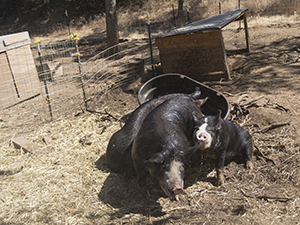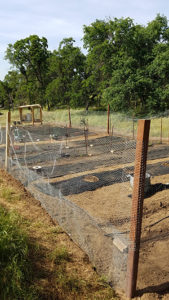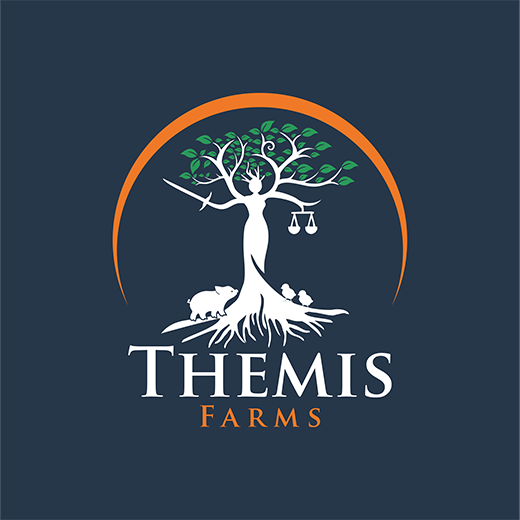


Busy Weekend on a Small Farm
Running a small farm is a TON of work, but it’s very rewarding.
We always start our day by opening the coops so the chickens can free-range during the day. Then, the pigs get their whole grains (soaked overnight for better absorption). We fill all the watering stations and troughs for our chickens and Berkshire pigs.
Outsmarting the pigs
One of the first projects we had to attend to was securing the watering trough for our 3 younger, female Berkshire pigs. Pigs love to turn over anything that has water in it and roll around in the mud it creates. They are not great at long term thinking — like having no water to drink. Allan secured the watering trough inside a cattle panel turned on its side and secured it to the outer fencing. Then he cut a hole that the pigs can get their head through to drink, but not big enough for them to tip the trough with their nose.
Getting the garden ready
Last year, we dug a trench 90-feet x 30-feet and buried hardware cloth to prevent the gophers from getting into the garden. Unfortunately, because we live in the foothills of some very large granite mountains, the trencher could not always get down a full 2 feet. The gophers capitalized on the spots the hardware cloth didn’t reach!
This year, we are digging holes 2-feet deep — by hand. We line each hole with hardware cloth and then fill the hole back in. We are doing this instead of raised beds for a number of reasons. Have you seen the price of lumber? Crazy expensive! Even if it wasn’t, we’re still busy trying to finish the walk-in cooler/butcher station so we can process our first Berkshire.
If we want any garden at all, we figured we have to resort to holes and hardware cloth as the next best option. Digging through hard, dry clay is not easy and it’s a slow process. So far we have 5 holes and have planted 4-5 varieties of squash, 4 varieties of cantaloupe, 4 varieties of watermelon, snap peas, slicing and pickling cucumbers.
Only one variety of squash and cantaloupe sprouted so far. We suspect the squash seeds might not be viable, so we replanted them as an experiment. If they don’t sprout the second time, we’ll know it was the seeds and not the gardener!
We started 2 more gopher-proof holes this weekend. They are 10-feet long and 4-feet wide. These are going to take a bit longer to complete. We will plant carrots and peppers (companion plants) in one, and probably beets and another companion vegetable in the second one.
We ran out of time to start tomatoes from seeds last year and we didn’t enjoy the varieties we had anyway. But because we’re getting a late start on our vegetable garden, we’ve got some growing in pots.
Chickens earning their keep
Another advantage to creating these gopher-proof beds instead of raised beds is that we can continue our companion farming philosophy. For the Mechelens (aka Malines), we’re going to create a coop and chicken run off the garden area. In the winter, once the growing season has come to an end, we’ll let the Mechelens forage through it. They’ll clear out all of the remaining plants and weeds, scratch and till the soil, and fertilize the soil with their poop. This will save us a ton of work come late winter/early spring when it’s time to plant our vegetables.
And we’re finishing 4 Bresse roosters that hatched about 12 weeks ago. We are adhering as closely as possible to the traditional Bresse method — corn/grains and milk. However, we are not stuffing them into small boxes (referred to as the Spruce by the French). They are in a small coop with some light and a little room to move around. We’re not willing to compromise our happy, healthy farm philosophy for a chicken dinner.
A wonderful weekend is coming to a close. A friend brought us fresh cherries from a roadside stand on the highway to Kings Canyon National Park, picked by the Mennonites. We’re looking forward to eating a scrumptious, homemade cherry pie for dinner to celebrate Memorial Day!
